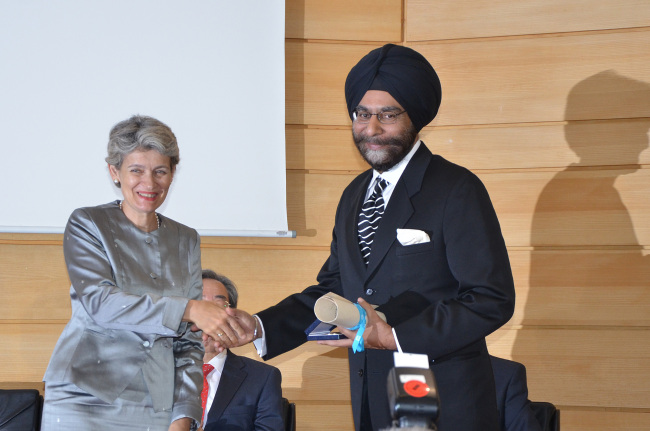Two groups that campaign against illiteracy in India and Chad have won the 2013 UNESCO King Sejong Literacy Prize.
UNESCO presented the prize to the Federation of the Associations of the Promotion of the Languages of Guera, Chad, and the National Literacy Mission Authority of the Indian Ministry of Human Resources Development in an award ceremony in Paris on Monday, the Korean National Commission for UNESCO said.
 |
Irina Bokova (left), director general of UNESCO, shakes hands with Jagmohan Singh Raju, director general of the National Literacy Mission Authority of India, after presenting the UNESCO King Sejong Literacy Prize in Paris on Monday. (Korean National Commission for UNESCO) |
The prize was created by the South Korean government in 1989 to memorialize the outstanding contribution to literacy made by Sejong the Great (1397-1450), who created the Korean alphabet, Hangeul.
It rewards the activities of governments or governmental agencies and nongovernmental organizations for promoting literacy. It has been presented on International Literacy Day, which falls on Sept. 8 each year, since 1990.
The Chadian federation is highly recognized for running 26 programs to educate tribal languages in Guera, one of its southern villages, in close cooperation with other agencies including the Education Ministry, universities and NGOs.
The mission in India was named the prize winner for the Saakshar Bharat (Literate India) program launched in 2009 with a vision of making 70 million adults literate by 2017. In a span of less than four years since its launch, 17.3 million adults have been certified as literate. More than 10 million Indians use the program each year, which is available in 26 languages in 25 regions.
The Korean Ministry of Culture, Sports and Tourism plans to invite the prize winners Oct. 7-11 to introduce them to Hangeul and its history and share the lessons of literacy campaigns.
By Chun Sung-woo (
swchun@heraldcorp.com)




![[Herald Interview] 'Trump will use tariffs as first line of defense for American manufacturing'](http://res.heraldm.com/phpwas/restmb_idxmake.php?idx=644&simg=/content/image/2024/11/26/20241126050017_0.jpg)

![[Health and care] Getting cancer young: Why cancer isn’t just an older person’s battle](http://res.heraldm.com/phpwas/restmb_idxmake.php?idx=644&simg=/content/image/2024/11/26/20241126050043_0.jpg)

